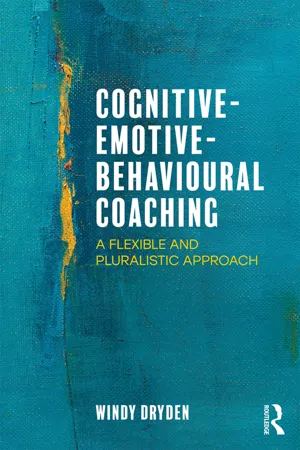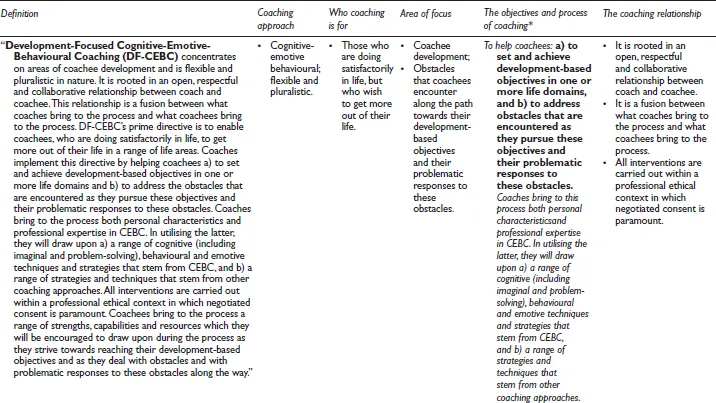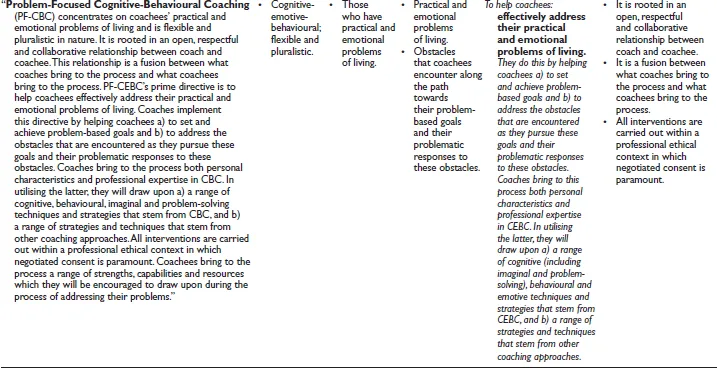![]()
Chapter 1
In this chapter, I am going to consider the nature of cognitive-emotive-behavioural coaching (CEBC).1 In doing so, I will provide two definitions of CEBC since, as you will see, in my view there are two different types of CEBC. In defining CEBC, I will do so by addressing five points.
1.1.A definition of coaching needs to cover five points
1.1.1.Coaching approach
It is useful for a coaching definition to make clear what approach to coaching is being taken. Thus, I do this in both definitions.
1.1.2.Who coaching is for
Initially, when coaching was being developed and promoted, it was important for coaches to establish coaching’s identity by stressing the differences between coaching and other forms of helping (in particular, counselling and psychotherapy). In general, coaching was deemed to be for people who were functioning satisfactorily in life, but who wanted to develop themselves in one or more areas of their life. In taking this line, it is clear who coaching is for prior to the commencement of coaching (i.e. those who are functioning satisfactorily in life and are seeking some kind of self-development). In my view, therefore, who coaching is for, prior to the commencement of coaching, needs to be made explicit in any definition of coaching.
1.1.3.Area of focus
It is important that a definition of coaching make clear what is the focus area of coaching and I strive to do this in my definitions.
1.1.4.The process and objectives of coaching
Coaching objectives can be seen as the outcome of coaching, while the coaching process points to how coaches help their coachees reach their objectives. Both of these need to be made explicit in any definition of coaching.
1.1.5.The coaching relationship
Given the importance accorded to the coaching relationship in the field of coaching (e.g. O’Broin & Palmer, 2006; 2010a), it is important that any definition makes clear what the nature of this relationship is.
1.2.What is cognitive-emotive-behavioural coaching (CEBC)?
You will notice that I have called this book “Cognitive-Emotive-Behavioural Coaching” rather than “Cognitive-Behavioural Coaching”, which is what the approach is usually called. I have done this for a number of reasons. First, emotions are an integral part of coaching and thus it not did feel right to me to omit them from the book’s title when I had an opportunity to give them equal billing with cognitions and behaviours. Second, when criticised by those who say that the approach neglects emotions, cognitive-behavioural coaches and therapists generally explain that CBC/CBT does, in fact, consider emotions to be a central focus for understanding and intervention. Indeed, I have given the same explanation myself in the past. However, as I have done so, a little voice inside me has said, “Well, if that is the case why don’t we include emotions in the title of the approach?” This is my opportunity to do so.
1.3.Two types of cognitive-emotive-behavioural coaching
One of the problems of defining cognitive-emotive-behavioural coaching (CEBC) is that there are, in my view, two types of CEBC. The first type of CEBC is what I call development-focused cognitive-emotive-behavioural coaching (DF-CEBC). Here, the main emphasis is on helping coachees to develop themselves, but also to deal with obstacles to doing so whenever they are encountered. However, there is another type of CEBC which I call problem-focused cognitive-emotive-behavioural coaching (PF-CEBC). It is concerned with helping coachees address problems rather than strive for development. This type of coaching is sought by coachees who have one or more problems of living for which they seek help. They usually do so for one of two reasons. First, because they lack the clarity to solve the problem (which is what I call a practical problem). I call such coaching practical problem-focused cognitive-emotional-behavioural coaching (PPF-CEBC). Second, because they are in some kind of emotional pain (which is what I call an emotional problem). I call such coaching emotional problem-focused cognitive-emotive-behavioural coaching (EPF-CEBC). Such people who seek coaching help for their emotional problems often do so because coaching is more acceptable to them as a form of help than therapy or counselling, which they consider to be more stigmatising. I will define both types of coaching in this section because I consider both types in this book. I will begin by presenting my definition of development-focused cognitive-emotive-behavioural coaching.
1.3.1.Dryden’s definition of development-focused cognitive-emotive-behavioural coaching (DF-CEBC)
What follows is my definition of what I call development-focused cognitive-emotive-behavioural coaching (DF-CEBC). After presenting this definition, I will show how it addresses the five criteria that I have argued need to be covered in any definition of coaching (see Table 1.1).
Development-focused cognitive-emotive-behavioural coaching (DF-CEBC) concentrates on areas of coachee development and is flexible and pluralistic in nature. It is rooted in an open, respectful and collaborative relationship between coach and coachee. This relationship is a fusion between what coaches bring to the process and what coachees bring to the process. DF-CEBC’s prime directive is to enable coachees, who are doing satisfactorily in life, to get more out of their life in a range of life areas. Coaches implement this directive by helping coachees: a) to set and achieve development-based objectives in one or more life domains, and b) to address the obstacles that are encountered as they pursue these objectives and their problematic responses to these obstacles. Coaches bring to the process both personal characteristics and professional expertise in CEBC. In utilising the latter, they will draw upon: a) a range of cognitive (including imaginal and problem-solving), behavioural and emotive techniques and strategies that stem from CEBC, and b) a range of strategies and techniques that stem from other coaching approaches. All interventions are carried out within a professional ethical context in which negotiated consent is paramount. Coachees bring to the process a range of strengths, capabilities and resources which they will be encouraged to draw upon during the process as they strive towards reaching their development-based objectives and as they deal with obstacles and with problematic responses to these obstacles along the way.
Table 1.1Dryden’s definitions of two types of cognitive-emotive-behavioural coaching
1.3.1.1.Coaching approach
This definition makes clear that the approach to coaching that is being defined is cognitive-emotive-behavioural in orientation and that this approach is both flexible and pluralistic (see Chapter 2).
1.3.1.2.Who coaching is for
This definition makes clear that development-focused cognitive-emotive-behavioural coaching is for those who are doing satisfactorily in life, but who wish to get more out of their life.
1.3.1.3.Area of focus
Development-focused CEBC as defined here has two areas of focus. The primary focus is on coachee development. The secondary focus is on obstacles that coachees encounter along the path towards their development-based objectives and on any problematic responses to these objectives.
1.3.1.4.The objectives and process of DF-CEBC
1.3.1.4.1.Objectives
The objective of DF-CEBC is for coachees to a) achieve development-based objectives in one or more life domains, and b) to address the obstacles that are encountered as they pursue these objectives and their problematic responses to these obstacles.
1.3.1.4.2.Process
The process of DF-CEBC is marked by coaches helping coachees a) to set and achieve development-based objectives in one or more life domains and b) to address the obstacles that are encountered as they pursue these objectives and their problematic responses to these obstacles. Coaches bring to this process both personal characteristics and professional expertise in CEBC. In utilising the latter, they will draw upon a) a range of cognitive (including imaginal and problem-solving), behavioural and emotive techniques and strategies that stem from CEBC, and b) a range of strategies and techniques that stem from other coaching approaches.
1.3.1.5.The coaching relationship
This definition of DF-CEBC addresses a number of aspects of the coaching relationship between coach and coachee: a) It is open, respectful and collaborative; b) It is a fusion between what coaches bring to the process and what coachees brings to the process; and c) All interventions are carried out within a professional ethical context in which negotiated consent is paramount.
1.3.2.Dryden’s definition of problem-focused cognitive-emotive-behavioural coaching (PF-CEBC)
What follows is my definition of what I call problem-focused cognitive-emotive- behavioural coaching (PF-CEBC). After presenting this definition, I will again show how it addresses the five criteria that I have used to assess the selected definitions (see Table 1.1).
Problem-focused cognitive-emotive-behavioural-coaching(PF-CEBC) concentrates on coachees’ practical and emotional problems of living and is flexible and pluralistic in nature. It is rooted in an open, respectful and collaborative relationship between coach and coachee. This relationship is a fusion between what coaches bring to the process and what coachees bring to the process. PF-CEBC’s prime directive is to help coachees effectively address their practical and emotional problems of living. Coaches implement this directive by helping coachees a) to set and achieve problem-based goals, and b) to address the obstacles that are encountered as they pursue these goals and their problematic responses to these obstacles. Coaches bring to the process both personal characteristics and professional expertise in CEBC. In utilising the latter, they will draw upon a) a range of cognitive, behavioural, imaginal and problem-solving techniques and strategies that stem from CEBC, and b) a...


